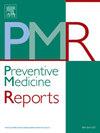Sleep patterns and risk of new-onset hypertension and cardiovascular disease in prehypertensive adults: The UK Biobank Study
IF 2.4
3区 医学
Q2 PUBLIC, ENVIRONMENTAL & OCCUPATIONAL HEALTH
引用次数: 0
Abstract
Objective
This study aimed to investigate the relationship between comprehensive sleep patterns and the incidence of new-onset hypertension (HTN) and cardiovascular disease (CVD) in individuals with prehypertension.
Methods
This analysis included 118,523 baseline participants from the UK Biobank (2006–2010) with follow-up through 31 December 2021. A sleep pattern included chronotype, sleep duration, insomnia, snoring, and excessive daytime sleepiness. Cox proportional hazards regression models were used to estimate hazard ratios (HRs) and 95 % confidence intervals (CIs).
Results
Over a median follow-up period of 12.5 years, 10,276 participants (8.7 %) developed HTN, and 7665 participants (6.5 %) experienced CVD events. Participants adhering to healthy sleep patterns had a 27 % lower risk of developing HTN (HR = 0.73; 95 % CI: 0.69–0.77) and a 23 % lower risk of CVD (HR = 0.77; 95 % CI: 0.72–0.82) compared with those with unhealthy sleep patterns. When analyzed as a continuous variable, higher healthy sleep scores were associated with a progressive reduction in disease risks.
Conclusions
Healthy sleep patterns are significantly associated with reduced risk the risk of new-onset HTN and CVD in people with prehypertension, emphasizing the importance of assessing and optimizing sleep health as part of clinical primary prevention strategies for CVD in prehypertensive populations.
高血压前期成人的睡眠模式与新发高血压和心血管疾病的风险:英国生物银行研究
目的探讨高血压前期人群综合睡眠模式与新发高血压(HTN)及心血管疾病(CVD)发生率的关系。该分析纳入了来自UK Biobank(2006-2010)的118,523名基线参与者,随访至2021年12月31日。睡眠模式包括时间类型、睡眠持续时间、失眠、打鼾和白天过度嗜睡。Cox比例风险回归模型用于估计风险比(hr)和95%置信区间(ci)。在12.5年的中位随访期间,10276名参与者(8.7%)发生HTN, 7665名参与者(6.5%)发生CVD事件。坚持健康睡眠模式的参与者患HTN的风险降低了27% (HR = 0.73;95% CI: 0.69-0.77),心血管疾病风险降低23% (HR = 0.77;95% CI: 0.72-0.82),与不健康睡眠模式的人相比。当作为一个连续变量进行分析时,较高的健康睡眠得分与疾病风险的逐步降低有关。结论健康的睡眠模式与高血压前期人群新发HTN和CVD风险降低显著相关,强调评估和优化睡眠健康作为高血压前期人群CVD临床一级预防策略的一部分的重要性。
本文章由计算机程序翻译,如有差异,请以英文原文为准。
求助全文
约1分钟内获得全文
求助全文
来源期刊

Preventive Medicine Reports
Medicine-Public Health, Environmental and Occupational Health
CiteScore
3.90
自引率
0.00%
发文量
353
 求助内容:
求助内容: 应助结果提醒方式:
应助结果提醒方式:


